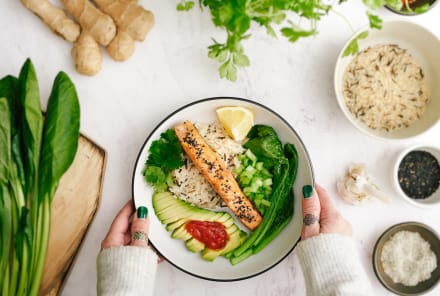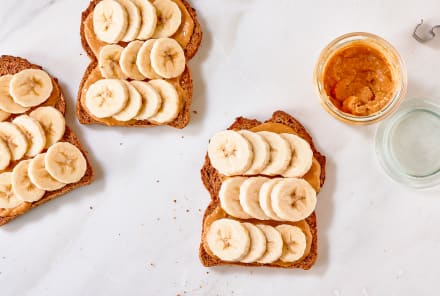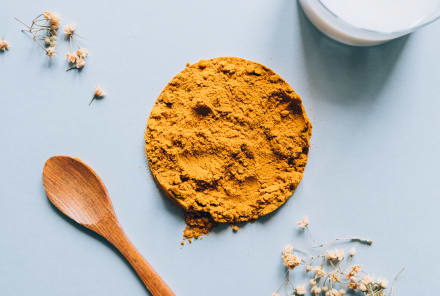Advertisement
4 Psychiatrist-Approved Tips To Rewire Your Brain & Boost Emotional Resilience


Your mindset plays a vital role in your overall longevity. Plenty of research1 has demonstrated the link between positive mental health and a longer, healthier life—and simple, everyday habits can make quite a difference.
Just take it from board-certified psychiatrist Sue Varma, M.D., author of Practical Optimism: The Art, Science, and Practice of Exceptional Well-Being, who shares her top tips to boost mental resilience on this episode of the mindbodygreen podcast.
Tune in to the full episode to hear them all (it's a gold mine of mental health advice!), but for now, take a peek at her four M's of mental health below. "These are my four go-to's whenever I see a patient [or] in my own personal life," she says. Check them out:
Mindfulness
Mindfulness can be a vague term, but Varma describes it as "anything that helps you be more present." It doesn't have to be a daily meditation practice—though a simple five-minute breathwork practice can be immensely helpful, she says. "It could be as simple as doing something single-mindedly," she notes.
Let's say you're cooking or doing the dishes: Rather than turning on a podcast or watching TV while you work, consider focusing on the task at hand, sending all of your attention to the present moment.
"You're not looking at a device. You're not trying to multitask," Varma adds. "Mindfulness is about being present and single-minded." You'd be surprised by how much of a difference that little tweak can make to your overall mindset.
Meaningful engagement
We likely don't need to tell you how important social connection is for your overall health—mental and physical. But it's not just about cultivating deep relationships; according to Varma, micro-connections are just as vital to your well-being.
Think of the interactions you have with a coffee shop barista, a co-worker, or even a stranger on public transportation. Those bite-sized pockets of connection all ladder up to meaningful engagement.
"It can be superficial; it can be fluff. It's the grocery store clerk that you say hello to, and they set aside something for you because they're thinking of you," Varma explains. "Those are more superficial but still meaningful connections." Research even shows2 that people who have more conversations with strangers tend to be happier.
Of course, that doesn't mean you should ignore your more personal relationships. Superficial conversations are necessary, but so are deeper, vulnerable connections.
"Ask questions about how you are really doing, put your phone away, and be open to hearing answers," Varma suggests. "[It's about] being very deliberate about your friendship and making it a practice." Here's our guide to making and maintaining deep friendships to have on hand.
Mastery
Next up, we have mastery. This doesn't mean you must become some sort of prodigy, but try to find 10 to 15 minutes a day to work on some skill—any skill.
"You don't have to be a master to experience mastery," Varma explains. "It's about something that makes you feel energized, invigorated, and you feel like you're learning… It's an activity that's just enough of a challenge but not enough where you give up but also is pleasurable and exciting."
For example, Varma herself has started taking salsa dancing lessons. "Am I great at it? No. But do I feel transported by it? Absolutely," she says. Essentially, mastery is another way to cultivate purpose, and research finds3 new hobbies and skills are linked to mental well-being. So find what hobby makes your heart sing, and dedicate some time (even minutes) to it daily.
Movement
Regular movement is so beneficial to your mental health. When you exercise, your heart rate increases and your body pumps more oxygen to your brain—and multiple studies4 have found that a well-oxygenated brain helps manage anxiety and depression5; other studies have found that exercise may help alleviate depression and anxiety overall6.
And you don't need much movement to reap the mental health benefits. Varma recommends "exercise snacking," which entails 10 to 15 minutes of movement a day for super-busy folks.
"What's also really interesting is that people who exercise also have a greater sense of purpose in life7," she adds. "So if you feel like you're lost and can't find your purpose, make it a daily movement practice."
The takeaway
If you'd like to prioritize your mental resilience yet don't know where to start, try Varma's four habits above. They may sound simple, but it's often small, everyday tweaks that make the biggest difference to your mental well-being. "If you're going to do anything today, this is what I want people to do," Varma adds. After all, there's no time like the present.
We hope you enjoy this episode! And don't forget to subscribe to our podcast on iTunes, Google Podcasts, Spotify, Amazon Music, or YouTube!
7 Sources
- https://pubmed.ncbi.nlm.nih.gov/22994191/
- https://journals.sagepub.com/doi/10.1177/0146167214529799
- https://www.nature.com/articles/s41591-023-02506-1
- https://www.ncbi.nlm.nih.gov/pmc/articles/PMC5934999/
- https://www.ncbi.nlm.nih.gov/books/NBK253746/
- https://www.ncbi.nlm.nih.gov/pubmed/21495519
- https://link.springer.com/article/10.1007/s10865-021-00220-2

5 Subtle Signs You Might Be Low In Omega-3 Fats & What To Do About It
Molly Knudsen, M.S., RDN

This Antioxidant-Rich Fruit Is A+ For Sleep & Recovery, Research Shows
Molly Knudsen, M.S., RDN

Which Is Healthier: One Drink Daily Or A Few Drinks On The Weekend?
Molly Knudsen, M.S., RDN

5 Subtle Signs You Might Be Low In Omega-3 Fats & What To Do About It
Molly Knudsen, M.S., RDN

This Antioxidant-Rich Fruit Is A+ For Sleep & Recovery, Research Shows
Molly Knudsen, M.S., RDN

Which Is Healthier: One Drink Daily Or A Few Drinks On The Weekend?
Molly Knudsen, M.S., RDN

5 Subtle Signs You Might Be Low In Omega-3 Fats & What To Do About It
Molly Knudsen, M.S., RDN

This Antioxidant-Rich Fruit Is A+ For Sleep & Recovery, Research Shows
Molly Knudsen, M.S., RDN

Which Is Healthier: One Drink Daily Or A Few Drinks On The Weekend?
Molly Knudsen, M.S., RDN

5 Subtle Signs You Might Be Low In Omega-3 Fats & What To Do About It
Molly Knudsen, M.S., RDN

This Antioxidant-Rich Fruit Is A+ For Sleep & Recovery, Research Shows
Molly Knudsen, M.S., RDN

Which Is Healthier: One Drink Daily Or A Few Drinks On The Weekend?
Molly Knudsen, M.S., RDN












